Google considers many factors when ranking content in its search results. Some of these”signals” affect rankings directly, while others indirectly impact them. E-A-T or Expertise, Authoritativeness, and Trustworthiness are Search Engine Optimization (SEO) elements that Google values. Still, they’re also tough to measure. In a nutshell, E-A-T SEO is essential for content that falls under a specific umbrella, such as Your Money or Your Life (YMYL) topics. This may be a new concept for some, so we are going to break down what E-A-T SEO is and its significance for YMYL content. We’ll also discuss specifically how to improve your E-A-T SEO.
What Is E-A-T SEO?
E-A-T stands for Expertise, Authoritativeness, and Trustworthiness. Those are three key factors that can determine how useful a specific page or resource is to users. Let’s say, for example, that you search for “how to save money”.

Money is a sensitive issue for most people, and search engines understand that significance. In fact, there’s a term for topics related to money or other “serious” lifestyle matters: Your Money or Your Life (YMYL). With YMYL topics, Google pays special attention to E-A-T SEO. If you’re looking for advice on how to save money, you’ll want to see sources that meet the three E-A-T criteria. But what are they?
E-A-T SEO Criteria
The criteria that Google uses to determine E-A-T value are relatively straightforward.
- Expertise. You want to take advice from people who know what they’re talking about. They might include industry experts, authors with credentials, and people who’ve published about the topic in the past.
- Authoritativeness. Ideally, you want to get YMYL advice from a website with authority in the subject. That means it’s a source that receives a lot of traffic for a specific topic, has good reviews, and has published content from experts.
- Trustworthiness. A source doesn’t only need to be authoritative. It also needs to be trustworthy. That means content needs to be accurate, offer external references, and be upfront about who its experts are.
If you’re somewhat familiar with SEO, you can imagine how difficult it is to measure E-A-T. That’s why it’s disputed whether E-A-T is a direct ranking factor, especially as it’s not included in the Core Web Vitals.
However, we do know that E-A-T is part of Google’s Search Quality Rater Guidelines. That’s basically the bible for the team that assesses the quality of Google’s search results. Google has said so themselves.
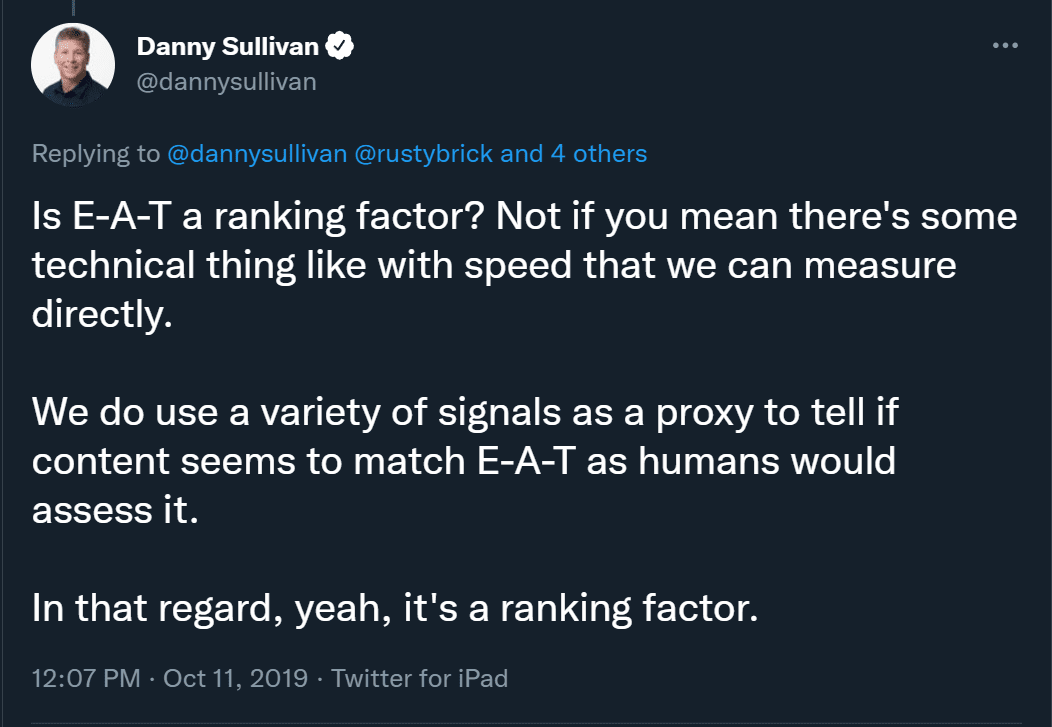
Unlike with Core Web Vitals, there are no E-A-T SEO scores. However, if you focus on publishing engaging content on a website with a great user experience, you should do well from an E-A-T perspective.
Years ago, content farms that stuffed short articles full of keywords provided very little value for searchers but dominated the Search Engine Results Pages (SERPs). It became very hard for users to know who to trust, especially for these sensitive YMYL topics, so Google began looking at E-A-T SEO as a way to determine whether a site was worth ranking.
What Is a YMYL Site?
Ideally, you want any website you work on to meet E-A-T SEO criteria. However, expertise, authoritativeness, and trustworthiness are critical for YMYL sites.
Google is more selective with results regarding “sensitive” topics. These are some (but not all) of the issues that fall under the umbrella of YMYL:
- Medical advice
- Financial advice
- Legal topics
- Parenting topics
- E-commerce stores
To put that list into perspective, imagine that you’re looking for restaurant recommendations for a specific area. You’ll probably find several list-based articles and decide based on which post you consider more trustworthy. It’s a relatively low-stakes situation, but people still put a lot of thought into that selection.
Now imagine that instead of looking for a restaurant, you’re searching for law firm recommendations or advice on investing your money. Those can be life-altering decisions, which is why they fall under the YMYL umbrella.
If you’re looking for information related to those topics, the top search engine results are typically high-quality. You’ll likely notice a lot of institutions, well-known publications, and very few (if any) small blogs with unknown authors.

To be clear, it’s possible to rank for YLYM topics with a new website. However, any niche that falls under the YLYM umbrella typically has a lot of competition because the stakes are higher.
Since the stakes are higher, though, getting more traffic in YLYM niches can translate to more valuable conversions. If you run a legal website, your leads can bring in thousands of dollars. The same goes for medical blogs, parenting websites, and other content that significantly impacts users’ lives.
Since early 2020 and the COVID-19 pandemic, Google has been exceptionally careful with ranking medical sites that even mention the disease. This, in turn, makes it even more important for those sites to maintain solid E-A-T practices. Smaller sites definitely have a hard time ranking, and those written by non-medical professionals with provable credentials are often disregarded. Even if the information is sound, the consequences of Google ranking incorrect YMYL information are massive.
How Can You Improve E-A-T SEO? (Factor by Factor)
Although you can’t quantify E-A-T SEO, you can follow best practices so that your content adheres to Google’s standards. Below, we’ll include fragments from Google’s Search Quality Rater Guidelines. That way, you’ll better understand precisely which qualities the search engine is looking for.
Expertise
Proper author attribution is essential when you publish YMYL content. If you post every article under a pseudonym, it can be challenging for Google to gauge whether you have the expertise it expects for your topics.
Ideally, if you publish content for YMYL topics, you should include your credentials and what makes you a reliable source. That means using author boxes, including an About Us page, and even sharing contact information.
The same principle applies if you have a team of authors. Google might decide not to rank great content higher if even one member of the team might not be considered credible.
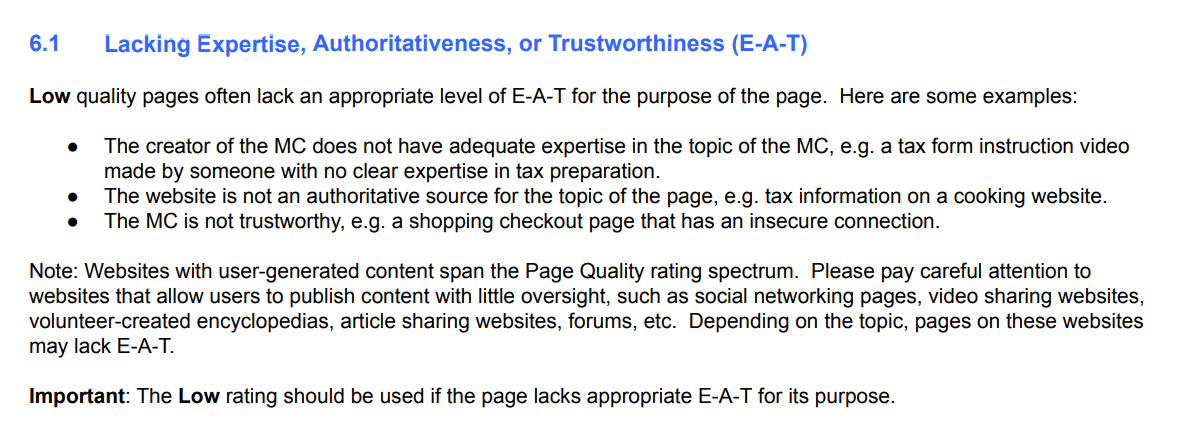
Generally speaking, if you rely on user-generated content for a YMYL niche, you might find it challenging to rank well. That’s because sources will vary significantly in terms of expertise. Your users might submit content that has little to do with your niche. Then, if you publish content unrelated to your website’s target niche, it will harm your E-A-T SEO “scores”.
Usually, users can spot low-effort content relatively easily. Poor research and writing are often byproducts of a lack of expertise. If you rely on non-expert authors, the quality of your content will reflect it.
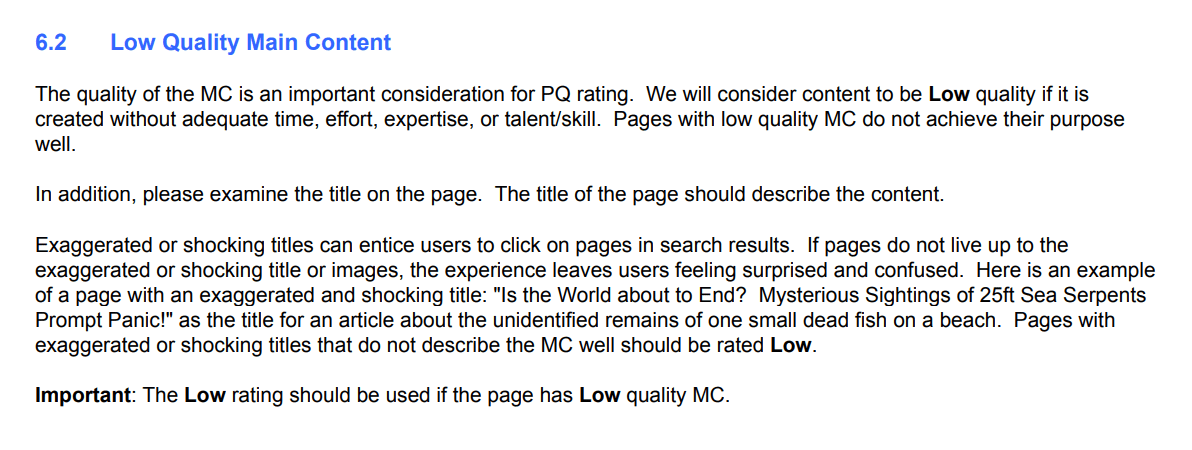
Overall, if you are an expert in your niche and can find other authors with excellent credentials, you’re well ahead of the pack. Your website’s quality should reflect that expertise, and users will reward you with higher engagement.
Authority is a popular concept when it comes to E-A-T SEO. Some websites are considered more authoritative than others due to a mix of several factors:
- The quality of your content
- How many websites link to you
- The quality of the sites that link to you
- How user-friendly your site is (Core Web Vitals come into play here!)
- How many times your content is shared on social media
Usually, websites with long track records, large content libraries, and multiple expert authors have peak authority. For example, suppose you’re looking for medical advice. In that case, you’re probably going to trust a high-authority website such as Harvard or WebMD over a blog:
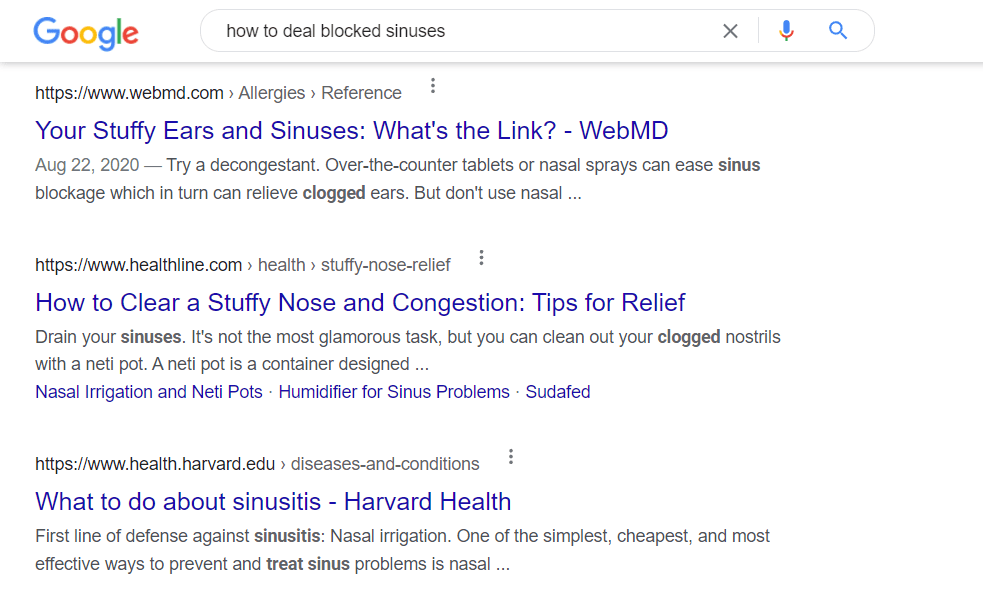
In theory, even a new blog can post medical advice that’s just as in-depth and as reliable as other, more well-known (or official) sources. You might even get a medical expert to publish content on your site. However, a new website can’t compete with a well-established resource’s authority, both in terms of user reputation and Google’s history.
The site that has the higher authority will almost always come first in the SERPs. The only way to get there yourself is to consistently publish expert content to build backlinks and authority.
Trustworthiness
There are many ways that Google determines how trustworthy a page is. A website with positive reviews, plenty of backlinks, and consistent social media shares is likely to be reputable.
Backlinks are perhaps some of the most important factors that show authority and reputation. Google considers links from other reputable sources (high-authority sites) as nods that say, “We think this content is good enough to recommend to our audience”.
Building backlinks often takes a long time. However, if you have a sizable content library from trustworthy experts, you’ll collect authority. Which will then help you get backlinks that will build trustworthiness.
The more authoritative your website is, the more likely it will appear among the first spots in the SERPs. That visibility, in turn, makes it easier to gain more backlinks and increase trust.
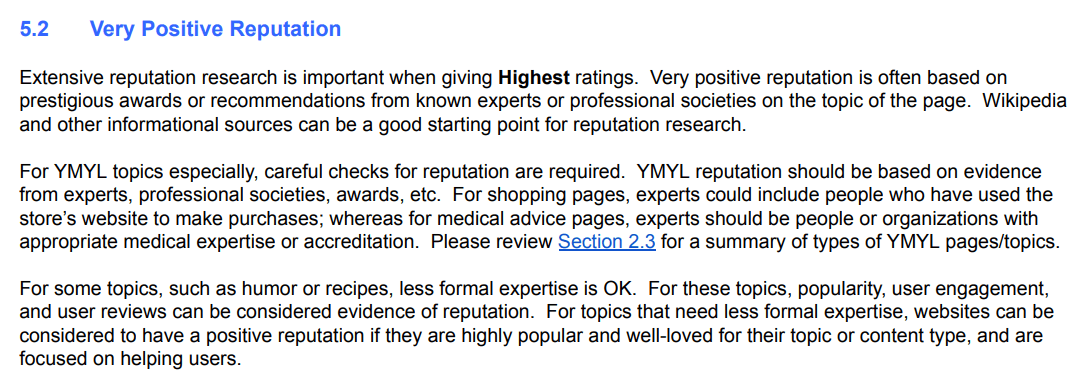
Expertise also ties into website trustworthiness. If you have a site with expert authors, users will be more likely to trust its content. That’s key for any website, but even more so for YMYL niches. If your content isn’t good enough, you won’t attract the signals that Google looks for in an authoritative website.
Many small details can impact how much visitors trust your website, even at a glance. For example, users can get a negative first impression if your Top-Level Domain (TLD) isn’t well-known. (Such as using .biz or .info over a .com or .org.) Your TLD doesn’t impact your site from an SEO standpoint, but it can affect how users perceive your business. And that can impact SEO.
Users are also more likely to trust websites that offer a great user experience. Unlike E-A-T SEO, you can measure Core Web Vitals and increase your scores to provide the best possible experience on your site.
Conclusion
The great thing about E-A-T SEO is that each factor is interrelated. If you have a website that publishes expert articles, that content will be more trustworthy. As your site grows, so should its authority. However, you also need to be mindful of other SEO factors that are more easily measurable, such as Core Web Vitals.
If you have a website that consistently publishes excellent posts and offers a positive user experience, rising to the top of search results should only be a matter of time. That is, at least, if you’re targeting the right keywords and optimizing that engaging content for them.
Do you have any questions about how E-A-T SEO affects your website? Let’s talk about them in the comments section below!
Featured image via Ribkhan / shutterstock.com








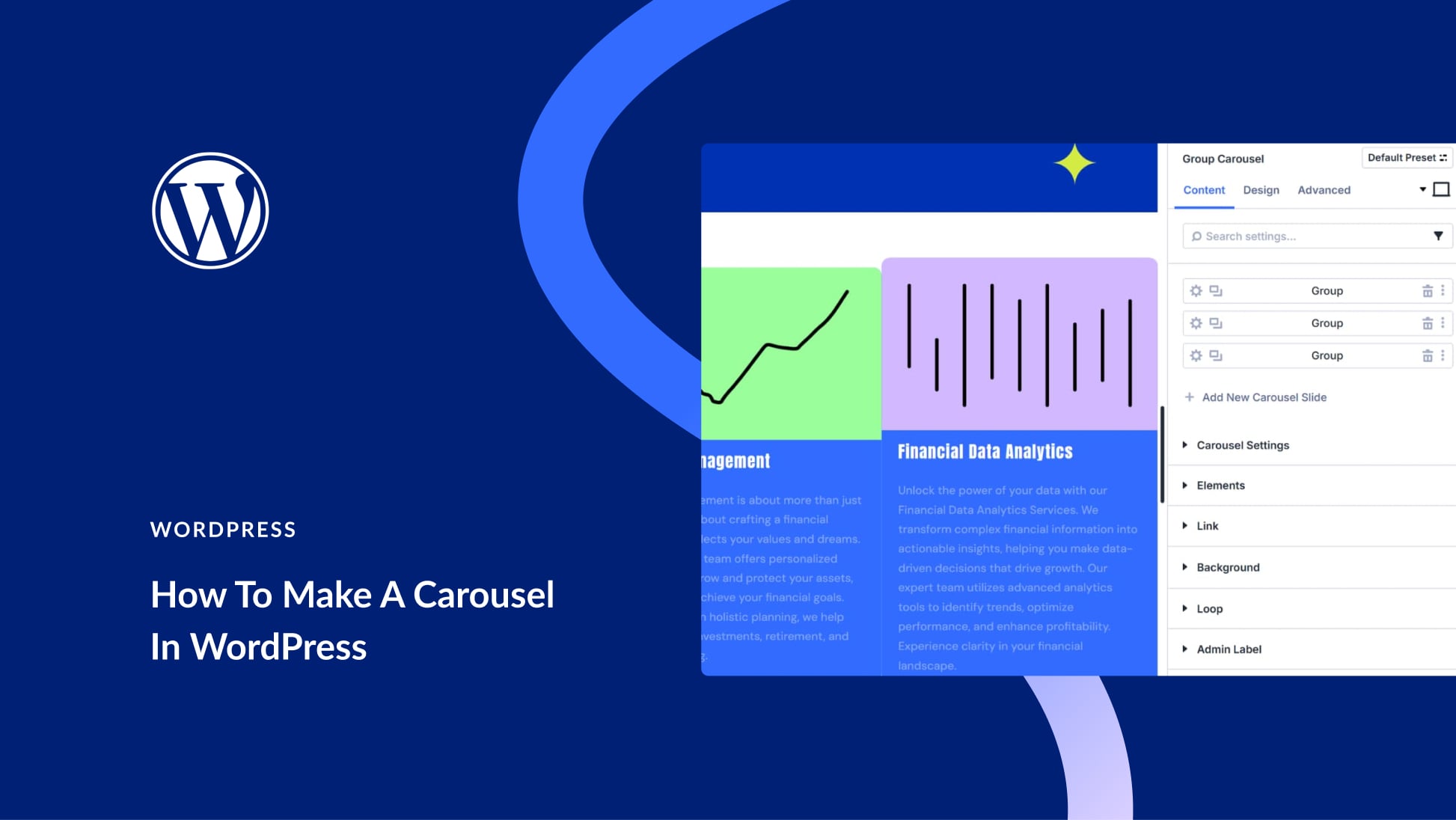
Thank You for providing this information.
testing